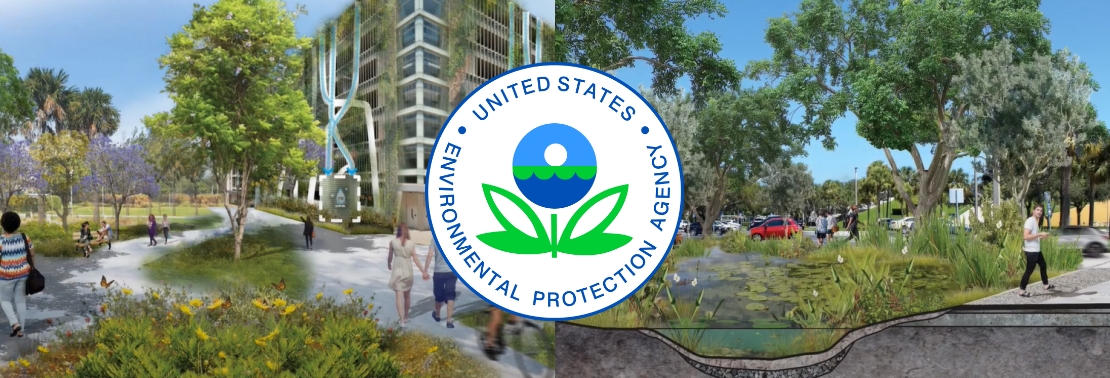EPA Staff of EPA writes:
The U.S. Environmental Protection Agency (EPA) announced the winners of its eighth annual Campus RainWorks Challenge, a national competition that engages college students in the design of on-campus green infrastructure solutions to help address stormwater pollution. This year’s winning projects demonstrate innovative design and illustrate the health and environmental benefits of good stormwater management.
Stormwater runoff is a significant source of water pollution in America
“EPA’s Campus RainWorks Challenge encourages students to transform classroom knowledge into innovative and replicable solutions for stormwater management, I congratulate this year’s winners and applaud the hard work of all of the teams that competed.”
EPA Administrator
Andrew Wheeler
Managing runoff remains a complex environmental challenge for local communities across the country. EPA’s Campus RainWorks Challenge asks students and faculty members at colleges and universities across the country to apply green infrastructure design principles, foster interdisciplinary collaboration and increase the use of green infrastructure on the nation’s college campuses. Since 2012 more than 700 teams have participated in the challenge.
In this year’s Challenge, EPA invited student teams to compete in two design categories. The Master Plan category examines how green infrastructure can be broadly integrated across campus while the Demonstration Project category focuses on how green infrastructure can address stormwater pollution at a specific site on campus. With the help of a faculty advisor, teams of students focused their expertise, creativity and energy on the challenges of stormwater management and showcased the environmental, economic and social benefits of green infrastructure.
The Challenge winners are:
Florida International University (1st Place Master Plan Category)
The “Coastal Eco-Waters: Adapting for a Resilient Campus” project redesigned the University’s Biscayne Bay campus to incorporate replicable green infrastructure practices that engage with the broader community to cultivate regional resiliency in an area that experiences extreme weather events.
Watch the team’s video about their project:
University of California at Los Angeles (1st Place Demonstration Project Category)
The team’s project, titled “Little Steps to a Sustainable Future,” redesigned a local elementary school campus to incorporate a variety of green infrastructure practices. Extensive stakeholder engagement across the school district led to a realistic design capable of managing stormwater runoff onsite and providing hands-on environmental education that will connect students to their watershed.
Watch the team’s video about their project:
University of Arizona (2nd Place Master Plan Category)
The “Against the Grain” project integrated multiple green infrastructure practices into a master plan design that revitalized key transportation and pedestrian corridors. This project sought to enhance flood protection through inclusion of bioretention facilities with native plants and trees and treat stormwater runoff as a resource by incorporating cisterns for irrigation.
Watch the team’s video about their project:
Arizona State University (2nd Place Demonstration Project Category)
In their project titled, “Ready! Set! Activate!” this team worked with a local elementary school to reduce local flooding during Arizona’s monsoon season and create a resilient, multi-functional space that effectively manages stormwater runoff and yields educational and ecological benefits.
Watch the team’s video about their project:
EPA is also pleased to recognize the University of California at Berkeley for honorable mention in the Demonstration Project category and Michigan State University for honorable mention in the Master Plan category.
More information: http://www.epa.gov/campusrainworks
BACKGROUND
Green infrastructure tools and techniques for stormwater management include green roofs, permeable materials, alternative designs for streets and buildings, trees, habitat conservation, rain gardens and rain harvesting systems. Utilizing these tools decreases pollution to local waterways by treating rain where it falls and keeping polluted stormwater from entering sewer systems. Communities are increasingly using innovative green infrastructure to supplement “gray” infrastructure such as pipes, filters and ponds. Green infrastructure reduces water pollution while increasing economic activity and neighborhood revitalization, job creation, energy savings and open space.
First place teams will receive a $5,000 student prize to be split among team members and a $5,000 faculty prize to support green infrastructure research and training. Second place teams will receive a $2,500 student prize and a $2,500 faculty prize. Designs were completed and submitted to EPA last fall for review and consideration.
Read more: EPA Announces Winners of its Annual Campus RainWorks Challenge
 Greenroofs.comConnecting the Planet + Living Architecture
Greenroofs.comConnecting the Planet + Living Architecture






Congratulations to the 8th Annual Campus EPA RainWorks Challenge Winners – Greenroofs.com – Nuz Real
[…] Congratulations to the 8th Annual Campus EPA RainWorks Challenge Winners Greenroofs.com […]